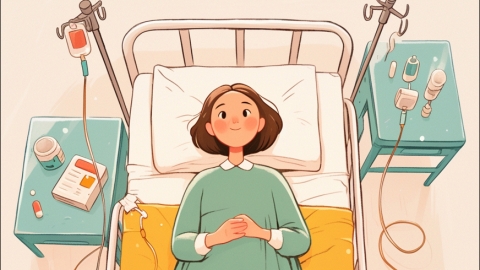What foods should be strictly avoided after a miscarriage?
Generally, people who have just had a miscarriage should strictly avoid eating foods such as crab, chili peppers, fried chicken, cake, and fermented rice (Laozao). They should also avoid taking medications such as aspirin enteric-coated tablets, minocycline hydrochloride tablets, compound norethisterone tablets, and misoprostol tablets, to prevent adverse effects on recovery and health. If discomfort occurs, timely medical attention is recommended. Detailed explanations are as follows:

I. Foods
1. Crab
Crab is a cold-natured food. Consumption may cause abnormal uterine contractions, leading to adverse reactions such as abdominal pain, diarrhea, and bleeding. Additionally, it may harm the stomach and spleen, weaken digestive function, and in severe cases, cause cold uterus conditions, leading to problems such as dysmenorrhea.
2. Chili Peppers
Chili peppers are spicy and irritating. They may stimulate uterine contractions, worsen bleeding symptoms, and be detrimental to uterine recovery. At the same time, they may exacerbate internal inflammation and affect overall body recovery.
3. Fried Chicken
Fried chicken is high in fat and greasy. Consumption may cause indigestion, leading to digestive problems such as abdominal pain, diarrhea, and gastrointestinal bloating. Moreover, it may suppress appetite, reducing the body's intake of important nutrients such as vitamins, sugars, and proteins, thus being detrimental to recovery and health.
4. Cake
Cake is a high-sugar food. Excessive intake may cause blood sugar fluctuations. At such times, the body secretes large amounts of insulin, which may increase the body's burden and be unfavorable for recovery.
5. Fermented Rice (Laozao)
Fermented rice contains a large amount of alcohol. Alcohol intake may trigger blood vessel contraction and expansion reactions, possibly leading to abnormal increases in blood flow, which can negatively affect health. In addition, alcohol may damage other internal organs, hindering the body's recovery.
II. Medications
1. Aspirin Enteric-Coated Tablets
Aspirin enteric-coated tablets are non-steroidal anti-inflammatory drugs that can relieve pain and fever. However, long-term or excessive use may affect kidney function and may mask the condition, delaying treatment.
2. Mifepristone Tablets
This is an anti-progesterone drug. Its mechanism of action is to compete with progesterone for receptors, blocking progesterone activity, causing degeneration of chorionic tissues and decidua, releasing endogenous prostaglandins, promoting uterine contractions and softening the cervix, thereby achieving the purpose of terminating pregnancy. Using it shortly after a miscarriage will again interfere with the body's hormone levels, causing secondary damage to the uterus and seriously affecting recovery.
3. Minocycline Hydrochloride Tablets
Minocycline hydrochloride tablets are antibiotics. Although they can be used to treat infections, unless there are signs of infection, antibiotics should not be used arbitrarily to avoid disrupting the body's normal flora and affecting immunity.
4. Compound Norethisterone Tablets
This medication achieves contraceptive effects by inhibiting ovulation, altering the endometrial environment, changing the properties of cervical mucus, and preventing sperm penetration. Taking it shortly after a miscarriage will severely disrupt the body's hormonal balance, affecting normal recovery and possibly causing menstrual disorders.
5. Misoprostol Tablets
This medication mainly stimulates uterine smooth muscle, causing uterine contractions while softening and dilating the cervix to promote embryo expulsion. Taking it shortly after a miscarriage may cause abnormal uterine contractions, possibly leading to severe complications such as heavy bleeding and uterine perforation, endangering life and health.
Diet and medication use after a miscarriage should follow the guidance of a physician to ensure proper recovery and regulation. During the recovery period, maintaining good living habits, avoiding excessive fatigue, and ensuring adequate rest are beneficial for a speedy recovery.




